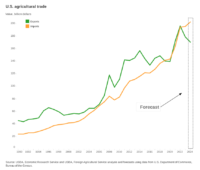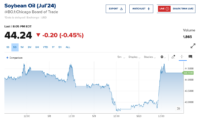Bloomberg's Clarice Couto reported this past Friday that "a surprising tax change in agriculture powerhouse Brazil has the potential to make soy grown in the world’s largest bean exporter less…
Trade: On The Minds of Farmers, and Senators
Recall that last month, at a press conference before the Senate Ag Committee’s first Farm Bill hearing in Kansas, Committee Chairman Pat Roberts pointed out that, “And trade — trade is on the minds of every farmer, every rancher. And I can assure you that trade is on the minds of my Senate staff and myself.”
Wall Street Journal writers William Mauldin and Jacob M. Schlesinger fleshed out more details on the observation made by the veteran GOP lawmaker in an article in yesterday’s Wall Street Journal.
“Republican lawmakers are showing increasing resistance to President Donald Trump’s trade agenda, worried that his plans could hurt exports from their states and undermine longstanding U.S. alliances,” Mauldin and Schlesinger stated.
The Journal article explained that, “The concerns indicate that the biggest threat to Mr. Trump’s trade policy—which emphasizes new bilateral deals and a tougher stance against countries blamed for violating trade rules—is coming from his own party. The opposition from Republicans, who control both chambers of Congress, stands to complicate Mr. Trump’s efforts to overhaul the North American Free Trade Agreement, or Nafta, and tackle alleged trade violations in China.”
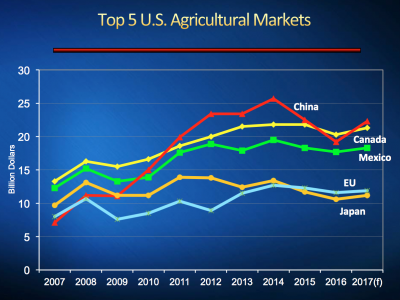
“While many Democrats in Congress are interested in working with the Trump administration on trade, Republicans who have long backed free trade—many of them close to business groups—are warning that imposing tariffs could lead to retaliation against U.S. goods. Lawmakers from farm states are upset that Mr. Trump in January pulled out of the unratified Trans-Pacific Partnership, or TPP, the 12-nation trade agreement that Barack Obama negotiated,” the article said.
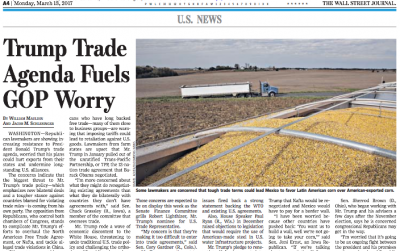
More specifically on NAFTA, which has facilitated greater agricultural trade between the U.S., Canada and Mexico, the Journal writers stated that, “Mr. Trump’s pledge to renegotiate Nafta is expected to provide an early test of congressional support for his policies. U.S. lawmakers took note when a Mexican lawmaker introduced legislation favoring Latin American products over American-exported corn, a key winner in Nafta. That move followed warnings from Mr. Trump that Nafta would be renegotiated and Mexico would have to pay for a new border wall.
‘I have been worried because other countries have pushed back: ‘You want us to build a wall, well we’re not going to take your corn,’’ said Sen. Joni Ernst, an Iowa Republican. ‘If we’re talking about renegotiating Nafta, we actually stand to lose ground in agriculture—so we would really have to work that very, very carefully.’
The Journal article also quoted Chuck Grassley, Iowa’s other GOP Senator, who like Senator Ernst, also serves on the Ag Committee, as saying, “‘We know what we have, and I guess I don’t think it’s as bad as what the president thinks it is,’ he said, citing Nafta, which opened markets for farm exports.”
With respect to some technical details regarding NAFTA, Bloomberg writer Andrew Mayeda reported last week that, “The U.S. government probably won’t begin ‘real’ negotiations to revamp the North American Free Trade Agreement until later this year, Commerce Secretary Wilbur Ross said.
“‘I would like the results tomorrow, but that is not the way the world works,’ Ross said [March 8th] in an interview with Bloomberg Television. He said it probably will be ‘the latter part of this year before real negotiations get under way.’
“Ross, who was sworn in last month as Commerce secretary, said he hopes the talks don’t take ‘substantially longer than a year.'”
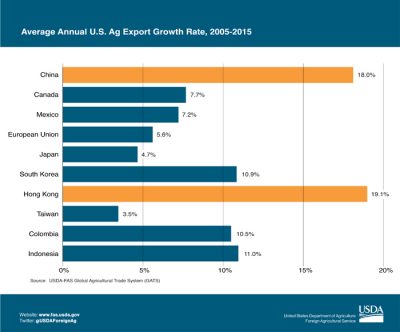
The Bloomberg article also explained that, “Ross said the Trump administration is having ‘preliminary’ discussions with U.S. lawmakers about Nafta, but hasn’t given Congress official notice that it will start negotiations. Under the law that hands the president so-called fast-track authority on trade pacts, Trump must give Congress 90-days’ notice that he intends to revise an existing agreement. Before starting talks, he must lay out the administration’s goals and consult with key committees in the House and Senate.
“Any of the three Nafta participants can withdraw from the deal on six-months’ notice. Trump has said he would pull out if his counterparts aren’t willing to renegotiate a deal.”
Meanwhile, Shawn Donnan and Demetri Sevastopulo reported on Friday at The Financial Times Online that, “A civil war has broken out within the White House over trade, leading to what one official called ‘a fiery meeting’ in the Oval Office pitting economic nationalists close to Donald Trump against pro-trade moderates from Wall Street.
“According to more than half a dozen people inside the White House or dealing with it, the bitter fight has set a hardline group including senior adviser Steve Bannon and Trump trade adviser Peter Navarro against a faction led by Gary Cohn, the former Goldman Sachs executive who leads Mr Trump’s National Economic Council.”
The FT article stated that, “Mr. Cohn has also been featuring more prominently in discussions over the renegotiation of the North American Free Trade Agreement with Canada and Mexico, one of Mr Trump’s top trade priorities.
“After a meeting with Mr Cohn and other White House officials on Thursday, Mexico’s foreign minister, Luis Videgaray, said the goal was to wrap up talks quickly and by the end of this year. That contradicted Mr Ross, who has called for deeper and potentially longer talks that could drag well into next year.”
As the trade policy debate unfolds, Bloomberg writers Alan Bjerga, Blacki Migliozzi and Cindy Hoffman provided a closer look at agricultural export issues in a global context in an article from yesterday.
“For many years, U.S. dominance as the top agricultural exporter has been slipping even as rising sales have allowed producers to prosper. Simply put, other countries have been able to catch up as they develop more farmland and improve their own trade prospects. Now President Donald Trump’s aggressive positions on U.S. trade relations threaten to worsen the relative decline of U.S. exports, as countries look elsewhere for agricultural products,” the Bloomberg writers said.
How U.S. Farms Win and Lose When Competitors Rise https://t.co/pB4CiGHVge pic.twitter.com/D33X2bUaVK
— Farm Policy (@FarmPolicy) March 13, 2017
The Bloomberg article indicated that, “A look at the U.S. share of bulk farm commodities shipped overseas—ranging from corn, soybeans and wheat to cotton, coffee and rubber—from the past 15 years shows the U.S. portion of global exports has fallen from 26 percent in 2000 to 18 percent in 2015. While U.S. exports have increased, Brazil and the Black Sea have risen proportionally much faster, making the U.S. less central to agricultural trade.”
Yesterday’s article added that:
‘If a trade war led to the U.S. being less able to sell its soybeans or wheat, you would find quickly that the rest of the world would say, ‘thank you.” [Joe Glauber, a former chief economist for the USDA ] said.
More trade perspective from the executive and legislative branches can be expected on Tuesday as the Senate Finance Committee holds hearing to consider the nomination of Robert Lighthizer to be United States Trade Representative.






